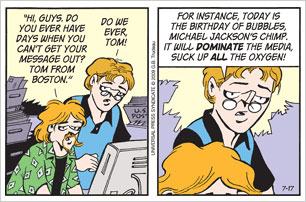
The Most Important Questions To Ask About the CIA's Targeted Killing ProgramWe know Cheney ordered it kept secret. What don't we know?
Posted Wednesday, July 15, 2009, at 1:48 PM ETWhat have we learned this week about the once-secret CIA plan to target and kill members of al-Qaida? It stemmed from George Bush's secret order in 2001 that allowed the CIA to capture and, if necessary, take out members of the terrorist network. The plan reportedly focused on killing terrorists at close range rather than blowing them up with remote-guided bombs. And former Vice President Dick Cheney told the CIA not to inform Congress about the program.
What don't we know? Much more. As the probing continues into what, precisely, this program was all about, here's a list of the most important outstanding questions. The answers will determine whether this episode fades or turns into the first full-blown intelligence fiasco of the young Obama administration.
 1) Under what authority did Dick Cheney keep this program a secret from Congress? CIA Director Leon Panetta reportedly said the program was kept from Congress under orders from the former vice president. How was Cheney allowed to make this call? Nothing in the National Security Act, which requires the executive branch to tell Congress about intelligence activities, authorizes the vice president to determine when lawmakers should be informed. That's the president's job and also the responsibility of the heads of the intelligence agencies. The law is famously murky about when the president or intelligence officials must go to Congress with word of their plans, but nowhere does it say the vice president decides. We know that President Bush gave Cheney extraordinary powers to classify and declassify information. But none of this amended the National Security Act, which focuses on this narrower question of when to brief Congress about classified information. Naturally, we also need to know whether Bush knew of Cheney's decision or whether he authorized it.
1) Under what authority did Dick Cheney keep this program a secret from Congress? CIA Director Leon Panetta reportedly said the program was kept from Congress under orders from the former vice president. How was Cheney allowed to make this call? Nothing in the National Security Act, which requires the executive branch to tell Congress about intelligence activities, authorizes the vice president to determine when lawmakers should be informed. That's the president's job and also the responsibility of the heads of the intelligence agencies. The law is famously murky about when the president or intelligence officials must go to Congress with word of their plans, but nowhere does it say the vice president decides. We know that President Bush gave Cheney extraordinary powers to classify and declassify information. But none of this amended the National Security Act, which focuses on this narrower question of when to brief Congress about classified information. Naturally, we also need to know whether Bush knew of Cheney's decision or whether he authorized it.
2) Why did it take so long for Panetta to find out? What's going on over at the CIA that it took four months to inform the new director about a program that even the daftest political observers could tell was radioactive? Wouldn't Cheney's order to keep it from Congress, given the vice president's reputation for being obsessive about secrecy, have set off alarm bells at the agency? Panetta doesn't have a background in intelligence, but he was a lawmaker, and he understands oversight. Presumably, he spent much of his first days on the job figuring out what Bush-Cheney programs might be lurking on the shelves that his former colleagues in Congress would want to know about. Was he aggressive enough in ferreting them out? Who was in charge of this task for him? Panetta's chief of staff is Jeremy Bash, the former general counsel for the Democrats on the House intelligence committee. Presumably he'd want to know what secrets the agency had been hiding.
3) Who finally brought the program to Panetta's attention? The New York Times reported that the CIA's Counterterrorist Center told Panetta about the killing program. The CTC is an operational unit that focuses on tracking down terrorists and either capturing or eliminating them, and so it makes sense that this unit would have run the on-the-ground killing program. The CTC is staffed by career intelligence officers and employees, so it's almost certain that some members of its staff were working during the previous administration and were aware of the killing program's existence. We need to know what they—and others—knew about the program, in order to determine whether people were actively keeping it a secret from the new administration
 How Come the Brits Have Better Streaming Music Than We Do?
How Come the Brits Have Better Streaming Music Than We Do? Lithwick: What We Learned From the Sotomayor Hearings
Lithwick: What We Learned From the Sotomayor Hearings Would You Hire This Wide Receiver To Redecorate Your Home?
Would You Hire This Wide Receiver To Redecorate Your Home? Zooey Deschanel Would Be America's Sweetheart if America Had Any Taste
Zooey Deschanel Would Be America's Sweetheart if America Had Any Taste NYT Food Critic Frank Bruni Used To Be Chubby. But Was He Dangerously Fat?
NYT Food Critic Frank Bruni Used To Be Chubby. But Was He Dangerously Fat? The Week's Best Editorial Cartoons
The Week's Best Editorial Cartoons











Dollars to donuts, Cheney thought the radioactive part of this program was the implied lethal trespass on foreign soil. He did not want that exposed in public, and, I'll bet, he figured telling Congress was sure to get it exposed.
At the time, the foreign powers involved would have been _much_ more distressed by a NY Times article detailing an intention to do such things than by an actual operation. For a much more recent, but somewhat similar, case, consider the Pakistani government's reputed public vs. private position on lethal Predator strikes.
At the time, the domestically radioactive thing would have been a disclosure that the CIA did NOT have the means and intention of killing Al Qaeda leaders, should we happen to get actionable intelligence on their location.
-- Archae86
(To reply, click here)
This seems like a lot of blatantly partisan fuss over nothing. All hands agree that this was a program that was discussed, rejected, and never implemented. Partially, no doubt, it was rejected because it turned out not to be feasible and because the use of drones rendered it largely unnecessary, but legal and ethical qualms may have played a part. On the basis of currently available information, who's to say they didn't? Since when is any governmental agency required to inform Congress of programs it has considered and rejected? That's obviously absurd, and if this rule were to be applied across the board Congress would be overwhelmed with a flood of meaningless information it neither needs nor wants. That's one strong objection to this current tempest in a teapot. Another is that it is doing a lot to torpedo any possible spirit of bipartisanship at a time when Obama is trying to get Congress to overhaul our medical system. When push comes to shove, these ultraliberals would rather strut their ideological purity and discredit the previous administration than help their own party's President achieve concrete results. A third is simply that if we get in the habit of criminalizing the activities of previous administrations, sooner or later what's going around will come around and bite the Democrats on the ass. Even sensible Democrats ought to treat these people with the contempt they deserve.
-- dfs
(To reply, click here)